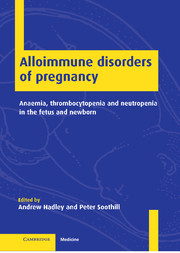 Alloimmune Disorders of Pregnancy
Alloimmune Disorders of Pregnancy Published online by Cambridge University Press: 26 October 2009
Epidemiology
Causes and incidence of alloimmunization
Anti-D is still the commonest cause of moderate and severe haemolytic disease of the fetus and newborn (HDFN) in the developed world. Alloimmunization after pregnancy with a D-positive baby is not as frequent as might be expected from the predicted incidence of D incompatibility between father and mother (60% of Dnegative pregnant women carry a D-positive fetus). There are a number of reasons for this. First, the volume of fetal cells crossing the placenta may be too small to initiate a response. Second, ABO incompatibility between mother and fetus offers some protection. Third, the Rh phenotype of the fetus affects antigenicity. Fourth, some women appear to be better responders to a small antigenic stimulus than others. About 17% of at-risk unprotected women are immunized by an ABO compatible pregnancy. Only 8% develop anti-D in the 6 months following a first pregnancy, but a further 9% develop anti-D early in a subsequent pregnancy, indicating that they had been ‘sensitized’ by the earlier pregnancy.
Ethnic groups
About 15–17% of the UK white population is D negative, and a similar approximation can be made for the Caucasian populations of North America, Europe, Australia and New Zealand. The incidence of D negatives is about 10% in Arabs, about 5% in ethnic blacks, 4–10% in Asian Indians and less than 1% in ethnic Chinese. HDFN associated with anti-D is therefore largely a disease affecting Caucasians, and Caucasians thus form a target for cost-effective preventive prophylaxis programmes.
To save this book to your Kindle, first ensure no-reply@cambridge.org is added to your Approved Personal Document E-mail List under your Personal Document Settings on the Manage Your Content and Devices page of your Amazon account. Then enter the ‘name’ part of your Kindle email address below. Find out more about saving to your Kindle.
Note you can select to save to either the @free.kindle.com or @kindle.com variations. ‘@free.kindle.com’ emails are free but can only be saved to your device when it is connected to wi-fi. ‘@kindle.com’ emails can be delivered even when you are not connected to wi-fi, but note that service fees apply.
Find out more about the Kindle Personal Document Service.
To save content items to your account, please confirm that you agree to abide by our usage policies. If this is the first time you use this feature, you will be asked to authorise Cambridge Core to connect with your account. Find out more about saving content to Dropbox.
To save content items to your account, please confirm that you agree to abide by our usage policies. If this is the first time you use this feature, you will be asked to authorise Cambridge Core to connect with your account. Find out more about saving content to Google Drive.